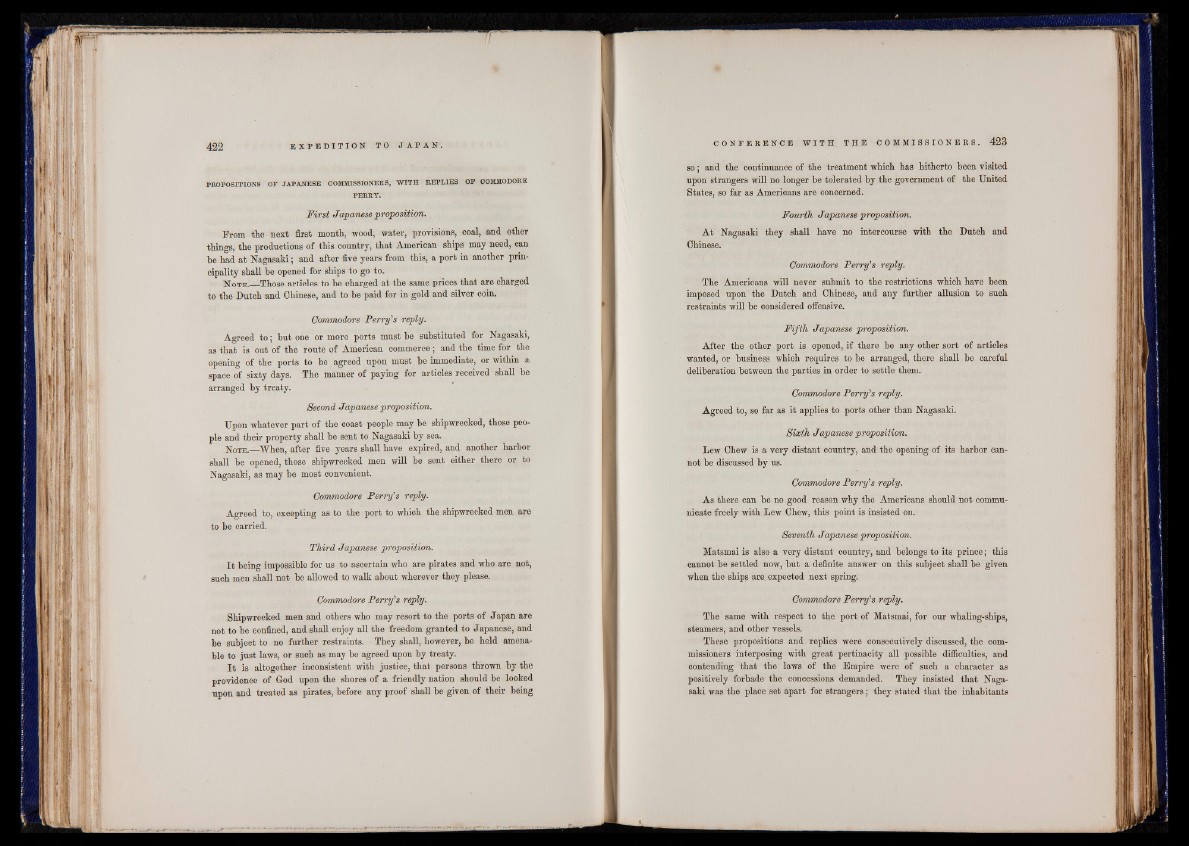
P R O P O S IT IO N S O P JA P A N E S E C O M M IS S IO N E R S , W I T H R E P L I E S O P C OM M O D O R E
P E R R Y .
First Japanese proposition.
From the next first month, wood, water, provisions, coal, and other
things, the productions of this country, that American ships may need, can
be had at Nagasaki; and after five years from this, a port in another principality
shall be opened for ships to go to.
N ote.—Those articles to be charged at the same prices that are charged
to the Dutch and Chinese, and to be paid for in gold and silver coin.
Commodore Perry's reply.
Agreed to ; but one or more ports must be substituted for Nagasaki,
as that is out of the route of American commerce; and the time for the
opening of the ports to be agreed upon must be immediate, or within a
space of sixty days. The manner of paying for articles received shall be
arranged by treaty.
Second Japanese proposition.
Upon whatever part of the coast people may be shipwrecked, those poo-
ple and their property shall be sent to Nagasaki by sea.
Note.—When, after five years shall have expired, and another harbor
shall be opened, those shipwrecked men will be sent either there or to
Nagasaki, as may be most convenient.
Commodore Perry's reply.
Agreed to, excepting as to the port to which the shipwrecked men are
to be carried.
Third Japanese proposition.
I t being impossible for us to ascertain who are pirates and who are not,
such men shall not be allowed to walk about wherever they please.
Commodore Perry's reply.
Shipwrecked men and others who may resort to the ports of Japan are
not to be confined, and shall enjoy all the freedom granted to Japanese, and
be subject to no further restraints. They shall, however, be held amenable
to just laws, or such as may be agreed upon by treaty.
I t is altogether inconsistent with justice, that persons thrown by the
providence of God upon the shores of a friendly nation should be looked
upon and treated as pirates, before any proof shall be given of their being
so: and the continuance of the treatment which has hitherto been visited
upon strangers will no longer be tolerated by the government of the United
States, so far as Americans are conoerned.
Fourth Japanese proposition.
At Nagasaki they shall have no intercourse with the Dutch and
Chinese.
Commodore Perry's reply.
The Americans will never submit to the restrictions which have been
imposed upon the Dutch and Chinese, and any further allusion to such
restraints will be considered offensive.
F ifth Japanese proposition.
After the other port is opened, if there be any other sort of articles
wanted, or business which requires to be arranged, there shall be careful
deliberation between the parties in order to settle them.
Commodore Perry's reply.
Agreed to, so far aB it applies to ports other than Nagasaki.
Sixth Japanese proposition.
Lew Chew is a very distant country, and the opening of its harbor cannot
be discusBed by us.
Commodore Perry's reply.
As there can be no good reason why the Americans should not communicate
freely with Lew Chew, this point is insisted on.
Seventh Japanese proposition.
Matsmai is also a very distant country, and belongs to its prince; this
cannot be settled now, but a definite answer on this subject shall be given
when the ships are. expected next spring.
Commodore Perry's reply.
The same with respect to the port of Matsmai, for our whaling-ships,
steamers, and other vessels.
These propositions and replies were consecutively discussed, the commissioners
interposing with great pertinacity all possible difficulties, and
contending that the laws of the Empire were of such a character as
positively forbade the concessions demanded. They insisted that Nagasaki
was the place set apart for strangers; they stated that the inhabitants